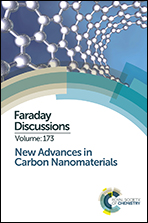Oxygen reduction reaction by electrochemically reduced graphene oxide†
Abstract
We show that a partially reduced graphene oxide electrocatalyst, synthesized by electrochemical reduction of graphene oxide (GO), displays significantly enhanced catalytic activity towards the oxygen reduction reaction (ORR) in alkaline solutions compared to the starting GO. The electrochemical partial reduction of GO was confirmed by X-ray diffraction and X-ray photoelectron spectroscopy. Electrochemical impedance spectroscopy (EIS) verified the enhanced electron transfer ability of the electrochemically reduced graphene oxide (ErGO) compared to GO. The resultant ErGO electrode showed enhanced capacitance and an ORR onset potential of −0.11 V vs. Ag/AgCl, similar to that of a nitrogen doped reduced graphene oxide (NrGO) electrode produced by a hydrothermal process. However the ErGO exhibited considerably lower electron transfer numbers (2.0–3.3 at a potential range of −0.4 V to −1.0 V) indicating that although both catalysts operate under combined 4e− and 2e− ORR processes, ErGO follows a more predominant 2e− pathway. The ORR process in ErGO has been linked to the presence of quinone functional groups, which favour the 2e− ORR pathway.
- This article is part of the themed collection: New Advances in Carbon Nanomaterials

 Please wait while we load your content...
Please wait while we load your content...